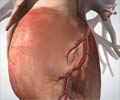Revolutionize artery treatment with drug-coated balloons (DCBs), replacing stents for a more effective procedure.
- Drug-coated balloons (DCB) may soon replace the use of stents for treating blocked arteries, according to experts
- The DCB technique is safer and more effective compared to stents, as latter can cause complications such as stent thrombosis, restenosis, and in-stent restenosis
- DCB is a medical device that is inserted into the artery and inflated, compressing the blockage against the artery wall while releasing drugs to prevent restenosis
Drug-coated balloon treatment in coronary artery disease: Recommendations from an Asia-Pacific Consensus Group
Go to source). Dr. Rajeev Gupta, a senior consultant at the Fortis Escorts Heart Institute, believes that this breakthrough in medical technology could have a significant impact on the treatment of CAD patients (1✔ ✔Trusted Source
Drug-coated balloon treatment in coronary artery disease: Recommendations from an Asia-Pacific Consensus Group
Go to source).
According to a leading expert. Dr. Sunil Pradhan, Senior Consultant Cardiologist and Director of the Cardiac Catheterization Laboratory at Mumbai's Kokilaben Dhirubhai Ambani Hospital says the drug-coated balloon (DCB) technique is a safer and more effective alternative to stents, which can cause complications such as stent thrombosis, restenosis, and in-stent restenosis.
This technique can reduce the risk of stent usage by 20 to 30% approximately according to Dr Sameer Dani, director and chief interventional cardiologist at Apollo CVHF Heart Institute in Ahmedabad.
What is Coronary Artery Disease?
Coronary artery disease (CAD) is a condition in which the blood vessels that supply the heart become narrowed or blocked, leading to a reduction in blood flow and oxygen supply to the heart. This can cause chest pain, shortness of breath, and in severe cases, a heart attack (2✔ ✔Trusted SourceWhat is cardiovascular disease?
Go to source).
Current Treatment Options for CAD
Traditionally, stents have been used to treat CAD by propping open narrowed or blocked arteries. However, stents have some limitations, such as the risk of re-stenosis (re-narrowing of the artery) and the need for long-term anti-platelet therapy.Drug-Coated Balloons as a Potential Alternative to Stents
Drug-coated balloons (DCBs) are a newer technology that may offer an alternative to stents in treating CAD. DCBs are balloons that are coated with a drug that is released into the artery when the balloon is inflated. The drug helps to prevent restenosis by slowing down the growth of cells that can cause the artery to narrow again (1✔ ✔Trusted SourceDrug-coated balloon treatment in coronary artery disease: Recommendations from an Asia-Pacific Consensus Group
Go to source).
“Drug coated balloon technique is an alternative new technique but further studies are required to observe a long-term follow-up period of at least three to four years. The technique especially becomes significant in light of younger individuals undergoing angioplasty,” added interventional cardiologist Dr Antonio Colombo, from Italy.
The Advantages of DCBs Over Stents
DCBs have several advantages over stents, including:Reduced Risk of Re-stenosis:
The drug coating on the balloon helps to reduce the risk of restenosis, which is a common problem with stents.
No Requisite for Long-Term Anti-platelet Therapy:
Unlike stents, DCBs do not require long-term anti-platelet therapy, which can be a burden for some patients.
More Flexibility:
DCBs are more flexible than stents, which can make them easier to place in complex arteries.
The Study on DCBs as a Potential Alternative to Stents
The study, published in the Journal of the American College of Cardiology, compared the outcomes of patients who received DCBs with those who received stents.The results showed that patients who received DCBs had similar outcomes to those who received stents in terms of major adverse cardiac events (MACE). However, patients who received DCBs had a significantly lower rate of target lesion revascularization (TLR), which is the need for repeat treatment due to restenosis.
Implications for CAD Treatment
The study suggests that DCBs may be a viable alternative to stents in treating CAD, particularly for patients who are at high risk of restenosis or who are unable to tolerate long-term antiplatelet therapy.However, more research is needed to fully evaluate the effectiveness and safety of this technology.
References:
- Drug-coated balloon treatment in coronary artery disease: Recommendations from an Asia-Pacific Consensus Group - (https://www.ncbi.nlm.nih.gov/pmc/articles/PMC8105061/)
- What is cardiovascular disease? - (https://www.heart.org/en/health-topics/consumer-healthcare/)
Source-Medindia










